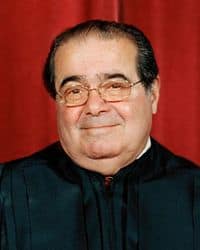Adam Liptak at the NYT finds the "aha moment" in the Supreme Court's Prop. 8 transcript signaling who likely voted to take up the case, and proposes a theory about why it was taken and the exit points that may shuffle it back to California where the ruling striking it down would stand.
After Justice Anthony M. Kennedy suggested that the court should dismiss the case, Justice Antonin Scalia tipped his hand.
“It's too late for that now, isn't it?” he said, a note of glee in his voice.
“We have crossed that river,” he said.
That was a signal that it was a conservative grant.
And how did that happen?
Justice Scalia, almost certainly joined by Justices Clarence Thomas and Samuel A. Alito Jr., apparently made a twofold calculation: that their odds of winning would not improve as same-sex marriage grows more popular and more commonplace, and that Justice Kennedy, who is likely to write the decision in the case concerning the 1996 law, would lock himself into rhetoric and logic that would compel him to vote for a constitutional right to same-sex marriage in a later case.
It is not that the conservatives felt certain they would win. It is that their chances would not improve in the years ahead.
That leaves the question of the fourth vote. The most likely answer is that it was that of Chief Justice John G. Roberts Jr., though he did not sound at all pleased on Tuesday to have the case before him.
There is also a chance that the fourth vote came from Justice Kennedy himself, and his very questioning provides support for that theory.
“I just wonder,” he said, sounding a little plaintive and a little angry, “if the case was properly granted.”
Who Wanted to Take the Case on Gay Marriage? Ask Scalia [nyt]
If you missed Ari Ezra Waldman's Prop 8 analysis from earlier in the week you can find it HERE (Part 1) and HERE (Part 2).




